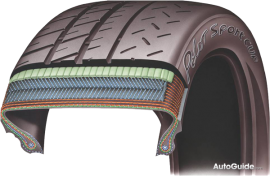If you think you’re going to get the most out of your car by driving it year-round with all-season tires, you’re in for a rude awakening. Summer tires (also called performance tires) provide excellent grip in warm weather and are the ultimate no-compromise choice for warmer weather driving.
While it’s been said before, it’s worth repeating: all-season tires are no-season tires. They’re the jack-of-all-trades in the tire world and don’t excel in any weather condition.
We know that dedicated rubber for snow and ice are an excellent choice for drivers because there are no compromises when it comes to delivering grip in low temperatures. Summer tires feature a similar focus on providing great traction through the warmer weather found in the three remaining seasons (spring, summer and fall).
“Summer tires offer better dry and wet grip than all-season tires,” said Mike Markoff, from Goodyear’s high performance tires division. “They are designed to maximize grip [in warm temperatures], thus trading off cold weather performance.”
Markoff points out that ultra-high performance tires have the best three-season (summer, spring and fall) grip. If you already have a set of winter tires for snow and ice season, then performance tires are the best choice for the rest of the year. Both summer and winter tires have a focused approach to grip making them the best choice in their respective seasons.
Grip in its Genes
 Unlike winter tires that are designed to be sticky and flexible in the cold, summer tires need to be grippy and stiff in order to provide excellent handling characteristics.
Unlike winter tires that are designed to be sticky and flexible in the cold, summer tires need to be grippy and stiff in order to provide excellent handling characteristics.
SEE ALSO: Cooper Zeon RS3-S Performance Tire Review
Recently, modern performance tires have been able to achieve these features by using different chemicals in the make-up of the tires.
For example, Yokohama’s new ADVAN V105 and AD08R tires feature sticky orange oil. “By incorporating Orange Oil, one of the stickiest natural substances in the world with silica in the rubber compound, we’ve improved dry and wet performance,” said James de Chavez from Yokohama Tires. “It’s a proven formula and was tested in high-end road racing competitions like the World Touring Car Championship and the Porsche GT3 Cup Challenge.”
Fun for Everyone:
Don’t think that performance tires are reserved for performance cars. Any car can benefit from added grip and as a driver you’ll easily appreciate the extra confidence that goes with more traction. Many luxury cars feature performance tires on their sedans due to their excellent handling capabilities.

“Our ADVAN V105 was designed to equip high-end European luxury sedans like the Audi A8, BMW M3 and Mercedes AMG models,” de Chavez said. “These luxury, performance vehicles produce high horsepower, but also demand much smoother and quieter ride characteristics.”
We know that Yokohama uses fancy materials in its tires to deliver grip but they also use clever engineering to make the tires quieter.
Looking at the ADVAN V105, you’ll notice it has wide grooves, to assist with water evacuation. But the pattern was developed with a variable pitch design that disrupts the airflow within those grooves offering a quieter ride.
Summer tires are also effective at preventing hydroplaning. Many tires feature grooves in the tread that channel water and help the tire cut through wet conditions. A central groove or spine is also common and helps to evacuate water to further improve vehicle control in wet conditions.
 Summer tires feature lower tread wear ratings than all-season tires. That means you’ll likely be replacing them sooner. Additionally, many performance tires are asymmetrical, which limits your ability to rotate the tires to increase lifespan of the tires.
Summer tires feature lower tread wear ratings than all-season tires. That means you’ll likely be replacing them sooner. Additionally, many performance tires are asymmetrical, which limits your ability to rotate the tires to increase lifespan of the tires.
Of course, there are other drawbacks to having dedicated performance tires. If you drive in a part of the country that sees four distinct seasons, then you have to be proactive when it comes to switching between your summer tires and your winter tires. If you switch out your summer rubber for the winter set too early, then you’ll wear out your snow-prepped tires prematurely. On the other hand, you don’t want to be caught in the snow with performance tires because they will have no traction at all.
SEE ALSO: TGIF[R-S]: New tires, Faster Car
The no-compromise design means you can get better handling and traction in warmer weather than all-season tires. The trade-off is that it’s costlier and less convenient to have two sets of tires to switch between. If you can manage those drawbacks, then a dedicated set of tires for summer is the ideal choice.



Leave a Reply